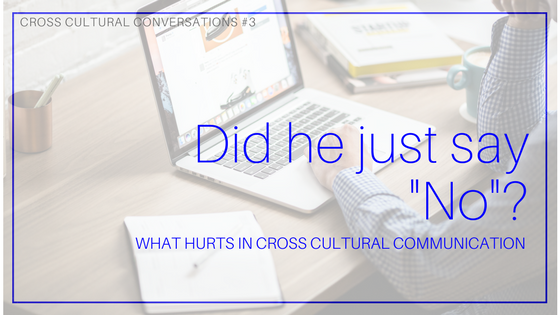 Cross-cultural communication can make friends. And it can make… well…enemies. Or not friends. Here’s one memorable conversation I’ve had with someone.
Cross-cultural communication can make friends. And it can make… well…enemies. Or not friends. Here’s one memorable conversation I’ve had with someone.
This young man was an Indian working in Germany. He had been there for almost 8 years when I met him to do a cross culture workshop. In an informal dinner he talked about his challenges studying, living and working there.
While he had a great friend circle, managed to get enough vegetarian food and even spoke German (of course some pronunciations were wrong!) he talked about some of his most difficult moments.
And one of them came from the sheer honesty of the Germans. If they couldn’t make it – to either a meeting or a dinner, they’d say, ‘No’.
While this is acceptable to most nationalities from the West, to an Indian, “NO” is not a word that comes easily. And that’s something you learn when you go deeper into cross culture. Communication is so important. What you say. What you don’t say. And what you hear.
As an Indian I can safely tell you that not only do I not say “No” when I wish to decline an offer, but I don’t even want to hear “No” when I make one. It hurts. It offends. It angers. And I can line up a thousand Indians who will agree with me.
Why? You ask.
It’s simple. I’m here to build a relationship with you. In my ‘collective’ nature, I believe in mingling with the crowd, working with consensus, carrying the team with me. I believe that I need to be for the larger part more amenable to suggestion.
So back to this young man in Germany. I’ll never forget his words. He talked about his first few experiences with his colleagues there.
The time he suggested a meeting and he was refused (Simple explanation: his colleague was busy during that time slot).
The time he suggested they take a coffee break. (His colleague was in the thick of it and wanted to finish up and leave for home.)
The time he suggested that they go over the project again. (His colleague wanted to do it the next day with a fresh mind).
All the three times he heard the dreaded word, “No“!
“No“, his colleague said to him.
What a terrible thing to say. To an Indian.
“My ears, they burned” he told me. “Every time I heard No, my ears burned“.
Which is why knowing the subtle nuances of cross-cultural communications is so important. Eight years down the line our young Indian is quite used to it. The ears have cooled and he and his colleagues understand each other perfectly well.
He accepts the honesty with which he is told “No”. But he still finds it difficult to say it.
And I can understand.
We don’t say it, we don’t hear it. Most of us cannot handle it. We have our ways out of it.
(But that’s another post, isn’t it? )
Read the earlier posts on Cross Culture? Here’s the last one.

